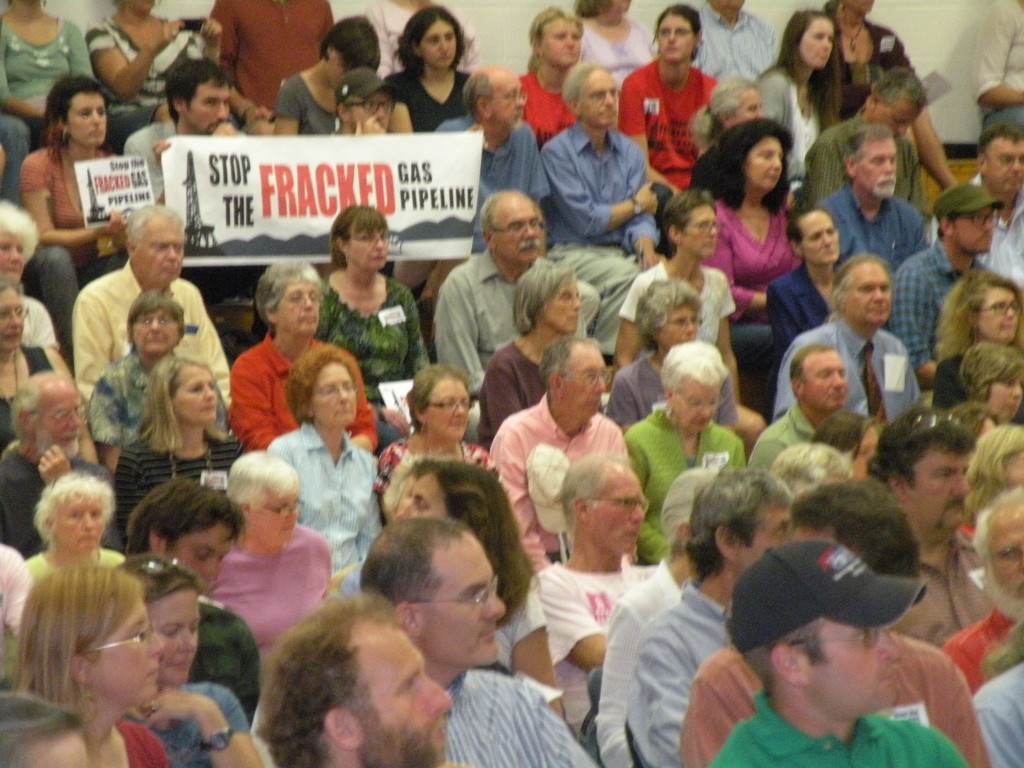Coalition Pledges to Continue the Fight
Montpelier, VT – Despite the growing chorus of opponents, the Vermont Public Service Board granted a Certificate of Public Good for the proposed fracked gas pipeline through Addison County, siding against the state’s largest environmental groups, a majority of public comments, and affected landowners.
“It’s simply irresponsible to increase our dependence on fracking, to wager on the fracked gas price bubble, and to build massive new fossil fuel infrastructure at a time when we’ve got so many untapped clean energy technologies,” said Ben Walsh, clean energy advocate at the Vermont Public Interest Research Group (VPIRG). “With mountains of evidence that fracked gas is a potential economic and climate disaster, Vermont needs this pipeline like the US needs another banking crisis. The proposed fracked gas pipeline is a shortsighted, risky venture, and green-lighting Phase I was the wrong call. We owe it to the future generations that will pay the price to continue the fight to stop this unnecessary step backwards.”
“The PSB’s approval of new fossil fuel infrastructure is a blatant abdication of its duty to the public good,” said Martha Waterman of Rising Tide Vermont. “Today we stand united and in solidarity with communities impacted by extreme energy extraction, and pledge to continue our resistance until Vermont Gas and the Shumlin administration scrap their fossil-fueled pipeline plans.”
Since Vermont’s first-in-the-nation ban on the drilling practice went into effect last year, scores of other cities (like Dallas, Texas) and even states (like Massachusetts) are looking to ban fracking, too. Today, toxic fracking waste has contaminated drinking water sources from Pennsylvania to New Mexico, and the amount of methane and other gas in drinking wells is so bad that some neighboring property owners are able to light the water from their faucets on fire. Earlier this week, a new study from the University of Missouri’s University’s Department of Obstetrics, Gynecology and Women’s Health even linked some fracking chemicals to sex changes in animals.
“Last year Vermont banned fracking to protect ourselves from the havoc this dirty, dangerous drilling process is wreaking in communities around the country,” said Naomi Leary, organizer with Toxics Action Center. “It’s simply wrong to increase our dependence on fracking just because we’re not living and breathing all that pollution ourselves.”
“This pipeline is not the answer, it’s the problem,” added Nate Palmer, a small farmer in Monkton, VT. “Not only is this fracked gas project dividing our communities opinions, it is physically ripping up farmers’ and homeowners land. We’re going to continue to work with our neighbors to stand up and fight back against this fossil fuel project.”
The coalition of environmental groups, citizens and landowners noted the many reasons why statewide opposition to new fossil fuel pipeline is growing tremendously. “We are seeing more and more community members getting the facts and waking up to the truth that this fracked gas pipeline project is wrong for Addison County, wrong for Vermont, and wrong for our planet,” said Barb Wilson, of Citizens for the Public Good (CPG). “With the long term negative environmental impacts to our climate, farmlands, woodlands, and wetlands, this pipeline project does not make any sense for Vermont whatsoever. This pipeline threatens the rights of Vermonters –as well as the communities where this gas is being fracked—to farm and live without worry of damaged soils and dangerous chemicals, to have clean abundant water and a climate conducive to growing crops.”
“Wagering on the cost of fracked gas is a risky bet because even industry insiders admit there’s no way to tell when the fracked gas bubble is going to burst,” added Walsh. “Turning a blind eye to the costs of this shortsighted and unnecessary new fracked gas pipeline is little better than denying climate change, and Vermont is better than that.”
# # #

